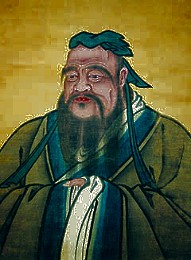| About China > History > Celebrities |
|
|
Confucius
Confucius' surname is Kong, his given name Qiu, and his social name Zhongni. According to the well-known Records of the Grand Historian (Shi Ji) by the Western Han Dynasty (206BC-8AD) court historian, Sima Qian, Confucius' ancestors were members of the State of Song during the Spring and Autumn Period (770-476BC). His great grandfather, fleeing the turmoil in his native Song, had moved to the State of Lu, somewhere near the present town of Qufu in southeastern Shandong Province, where the family became impoverished.
Confucius endured a poverty-stricken and humiliating youth and had to undertake such petty jobs as accounting and caring for livestock. He studied ritual with the Daoist Master Lao Dan. In his middle age Confucius had about three thousand disciples whom he taught and also devoted himself to political matters in the Lu State.
At the age of fifty, Confucius' talents were recognized when Duke Ding of Lu was on the throne. He was appointed Minister of Public Works and then Minister of Crime. But Confucius apparently offended members of the Lu nobles and was subsequently forced to leave office and go into exile.
In the company of his disciples, Confucius left Lu and traveled in the states of Wei, Song, Chen, Cai, and Chu, purportedly looking for a ruler who might employ him but meeting instead with indifference and, occasionally, severe hardship and danger.
Confucius returned to Lu in 484BC and spent the remainder of his life teaching, putting in order the Book of Songs, the Book of Documents, and other ancient classics, as well as editing the Spring and Autumn Annals, the court chronicle of Lu.
What was unique about Confucius' ideas was his attempt to add a moral dimension to many accepted ideas, beliefs, and social categories. The major terms are as follows:
1. Shih: Gentleman
The Chinese word translated as gentleman, "Shih", was the term that applied to the lower class of the nobles, the warriors and officials. Confucius added a moral dimension to this term and only used it to apply to people who were worthy moral models.
2. Li: Ritual
The Chinese word for ritual, "Li" was a term used to describe the elaborate rituals and elaborate manners and customs of Chinese nobles. Confucius broadened this concept to incorporate moral propriety. Living up to demands of "Li" now meant doing more than simply following ceremonies by rote, but also doing them with proper reverence. "Li" can mean "proper conduct" in fullest sense.
3. Dao: the Way
Dao of Confucianism is a definition of "the way", differing from that of the Taoism. Confucius believed that a virtuous life would bring people into harmony with the "way" or rather, with the cosmic will of an impersonal heaven.
Confucius' main moral concepts can be divided into a few overarching categories:
1. "Ren" which is often translated as "benevolence" or "human kindness". It meant being conscientious and altruistic. Humanity or "Ren" is what ties one together with another. It is the practical consideration of one human being for another based on a concept of reciprocity. This concept was not an abstract concept removed from daily life, for "Ren" developed out of fulfilling one's obligations to family and the community. This concept is best signified by what is called the silver rule of Confucianism: "Do not do to others what you do not want them to do to you."
2. "Li", or the rites, were to act as the guidelines for proper conduct. They helped to guide someone who may be unsure of what would be the truly "benevolent" act in certain circumstances. They were described as the "code of formal behaviors for stabilizing and disciplining our ever-changing circumstances".
3. "De, or virtue, is the ultimate goal of Confucian thought. Confucius saw virtue as combining the features of "Li" and "Ren". Virtue for him was concrete and determined by action, not contemplation.
A hallmark of Confucius' thought is his emphasis on education and study. Study, for Confucius, meant finding a good teacher and imitating his words and deeds. A good teacher was someone older who was familiar with the ways of the past and the practices of the ancients. While he sometimes warned against excessive reflection and meditation, Confucius' position appears to be a middle course between studying and reflecting on what one has learned. He who learns but does not think is lost. He who thinks but does not learn is in great danger.
Confucius is willing to teach anyone, whatever their social standing, as long as they are eager and tireless. He taught his students morality, proper speech, government, and the refined arts. Confucius' pedagogical methods are striking. He never discourses at length on a subject. Instead he poses questions, cites passages from the classics, or uses apt analogies, and waits for his students to arrive at the right answers.
Confucius' goal is to create gentlemen who carry themselves with grace, speak correctly, and demonstrate integrity in all things.
Confucius did not put into writing the principles of his philosophy; these were handed down only through his disciples, with most collected in the Analects of Confucius (Lun Yu). It made Confucius the model of courtliness and personal decorum for countless generations of Chinese officials. |
||||
 |



